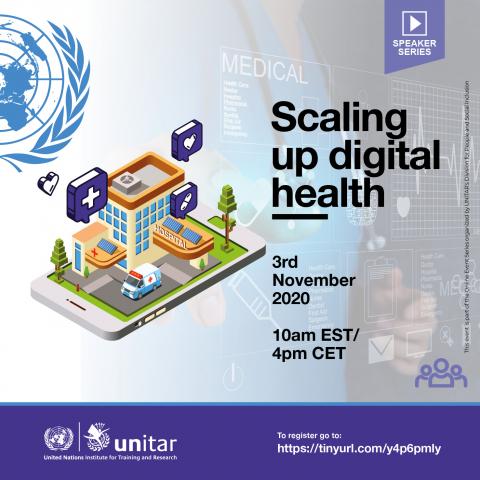
Responsible Digital Speaker Series # 6 - Scaling up digital health
The digital revolution continues to change the face of health systems the world over. At the 71st World Health Assembly (WHA), the World Health Organisation (WHO) recognised the full potential of the digital health revolution to enhance health service capacities and accelerate progress towards achieving health and wellbeing related Sustainable Development Goals (SDGs), especially SDG 3. They also recognised that the responsible and appropriate use of digital health solutions remains a great challenge. The potential for positive impacts through the application of digital health tools are clear, and it is often cited that they will be a key vehicle on the road to achieving Universal Health Coverage. However, poorly designed, unsustainable, unsafe and irresponsible digital health products can be a waste of time, energy and physical and financial resources, and more importantly can risk the wellbeing for those whose lives they were supposed to improve. Along this continuum of negative outcomes due to badly designed digital health tools, the perpetuation of stereotypes, the widening of the digital divide and the abuse of personal data are also key concerns.
The Digital Health Initiative aims to:
- Encourage and facilitate the sustainable, safe and responsible development and adoption of digital health products amongst international organisations, NGOs, the private sector and government organisations;
- Build capacity among health care workers, local governments, publics, and other end users;
- Ensure uptake and use of strong digital health tools and guidelines.
Following on from last week’s webinar on the challenge of “pilotitis”, this week we take a look at scaling up innovations for sustainable digital health projects.
Scale up is generally seen as the mark of a successful project. It proves that your idea doesn’t just work in a specific setting, but that it can be adapted to have broader value and gather substantial support. In reality, few pilots or small projects make it to scale up, for a number of reasons, but one way to improve the chances of being able to scale up your project is to make sure that it is designed and built with scale up in mind.
With my guest today, we will explore what it takes to design scalable digital health projects, and take a look at what are some of the key challenges and barriers to scale up.
At the end of this session, participants should be able to:
- Describe some of the key barriers to scaling up digital health pilots
- Identify the steps it takes to build digital health projects that are primed for scale up
This Responsible Digital Health Speaker Series will feature experts from healthcare, academia, public and private sector.
Participation is open to government officials, diplomats, staff of international organizations, development practitioners, faculty members, and administrators of educational institutions.

